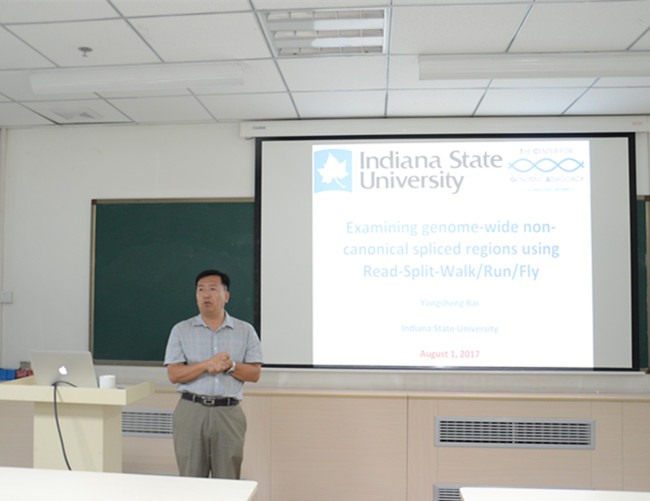报告题目:Examining genome-wide non-canonical spliced regions using Read-Split-Walk/Run/Fly
报告人:白永胜(Yongsheng Bai) 教授(美国印第安纳州立大学)
报告时间:2017年8月1日(星期二)下午16:00
报告地点:复杂系统研究所报告厅
报告人简介:Dr. Yongsheng Bai received his B.S. degree in Animal Science from the China (Beijing) Agricultural University. After obtaining his M.Sc. degree in Poultry Science from the University of Arkansas and his M.Sc. degree in Computer Science from The University of Texas at Arlington, respectively, he received his Ph.D. in Quantitative Biology from The University of Texas at Arlington in 2007. Dr. Bai worked as an independent senior bioinformatics research scientist for the Human Genome Sequencing Center at Baylor College of Medicine between 2007-2008, where he populated the Genboree Database for the Bioinformatics Research Laboratory at Baylor College of Medicine. From 2008-2013, Dr. Bai worked as a senior research scientist in the Department of Computational Medicine and Bioinformatics, University of Michigan and as an adjunct faculty member in the Biology Department at Eastern Michigan University during his tenure in Michigan. Dr. Bai helped to establish the Bioinformatics Core at University of Michigan from scratch and developed several cutting-edge next-generation sequencing data analysis methods/tools for the Core and community to use. From 2013-2014, Dr. Bai worked as a computational biologist in Morgridge Institute for Research at University of Wisconsin-Madison and contributed his expertise in de novo assembly methods evaluation algorithm - DETONATE.
Dr. Yongsheng Bai joined the Department of Biology at Indiana State University as an assistant professor in 2014 and is an affiliated faculty member in the Math & Computer Science Department. He oversees the bioinformatics core in The Center for Genomic Advocacy at Indiana State University. Dr. Bai published his research work in many scientific journals and conferences and served as reviewers and editors for many prestigious national international journals. His current research interests lie in the development and refinement of bioinformatics algorithms/software and databases on next-generation sequencing data, development of statistical model for solving biological and agricultural problems, bioinformatics analysis of clinical data, as well as other topics including, but not limited to, large-scale genome annotation and comparative “Omics”.

白永胜教授做精彩报告


